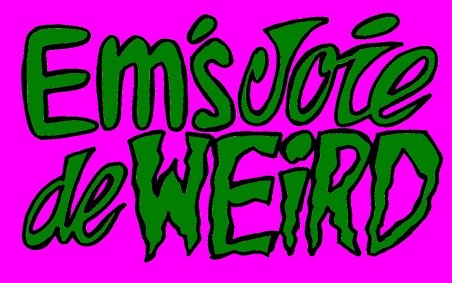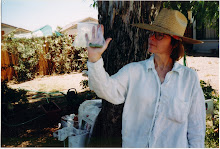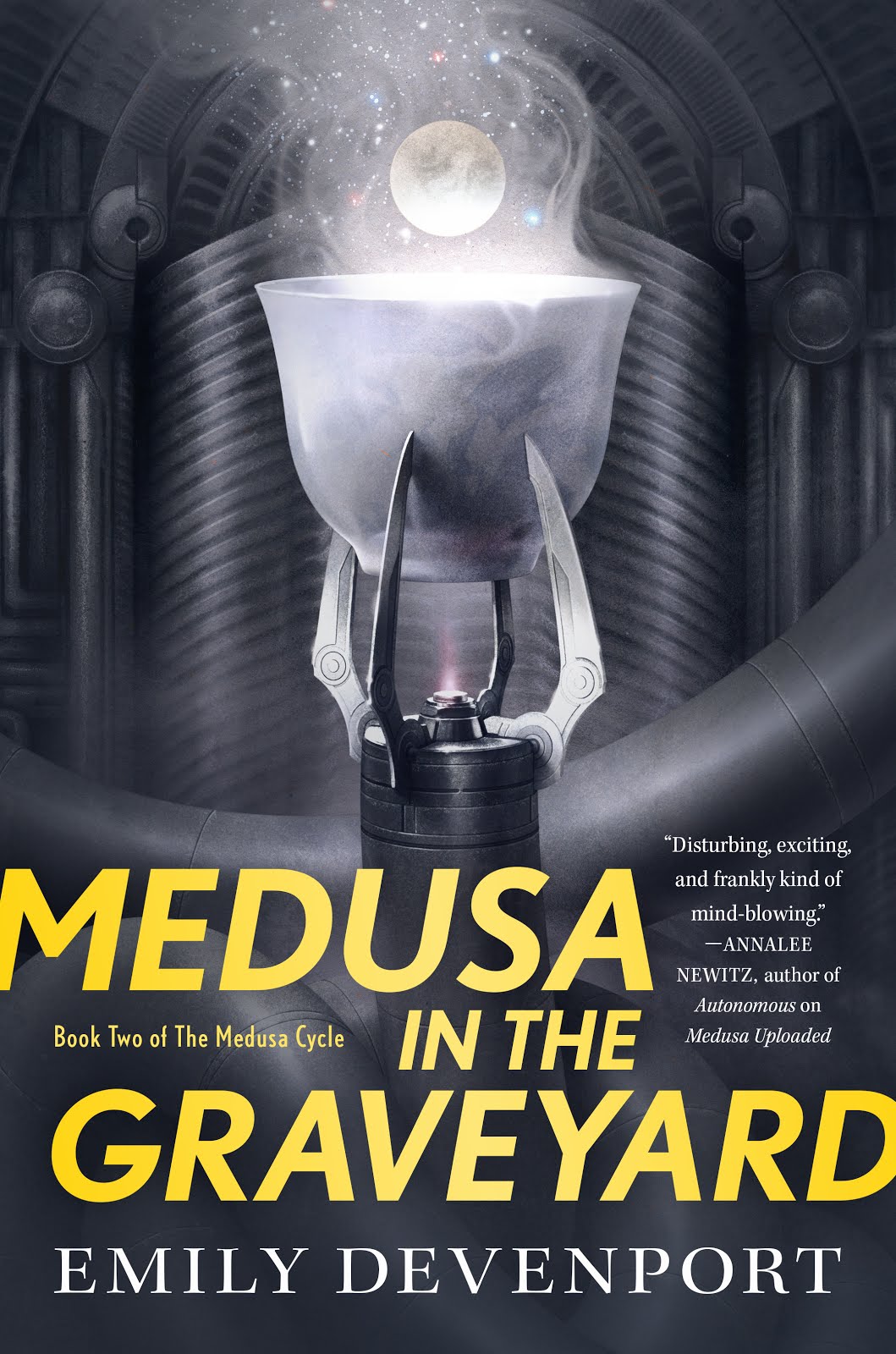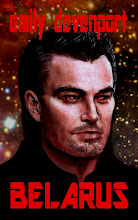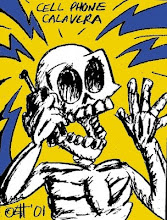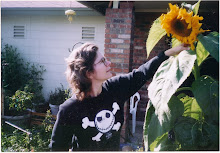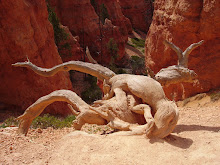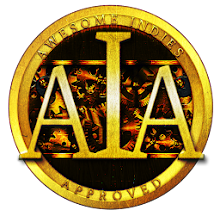
Thursday, October 29, 2009
Spoink!

I’ve been gardening in Phoenix for about 10 years now, and I’ve learned that if I want the seeds I sow to sprout, I have to use the blitz approach. If I want 3 or 4 sweet pea vines to sprout, I have to sow 10 to 15 seeds. If I want a tub full of zinnias, I need to sow 50 zinnia seeds. If I want larkspur to tower above the scene, I need to take the dried-up old stalks in June and shake them over the area where I want them to grow the following year, a hundred little seeds or so.
After that, I need to shred old, dead matter from expired plants and gently sift it over the spot where I sowed the seeds. I need to water that area 2 to 3 times a week. Over the next several weeks, sprouts will appear. I call them spoinkers. This is because I imagine spoink! is the sound the sprouts make when their leaves pop out of the seed casing. All over the garden, it’s spoink! Spoink! Spoink! And those casings go flying.
I’ve tried a lot of flower varieties for my Phoenix garden, and I’ve settled on a few stellar performers. Sweet peas, zinnias, stocks, larkspur, celosia, snapdragons, and nasturtiums. If I’m lucky, one or two of the dozens of sunflower seeds I sowed will grow big enough to open a giant head.
But Nature is way better at sowing seeds than I am. Every year, several of the flowers that grow in my garden were sown by wind, and rain, and pooping birds. They don’t need to scatter shredded mulch over the seeds, they don’t need to fuss over them at all. Wild sunflowers bloom in several places, and I try to leave 1 or 2 of them where they are, because the birds and bees love them so much. I figure I owe them at least that much. Because no one has perfected the blitz approach half as well as Nature.
And thank goodness for that!
Thursday, October 22, 2009
Ragnarok And Striped Socks

I don’t believe in the End of the World. Call it Ragnarok, The Apocalypse, Armageddon, The Rapture, 2012, whatever. It’s not going to happen.
Though admittedly, sometimes it almost happens. The climate changes, a comet slams into us, ice ages and volcanoes occur. There’s even evidence that the sun may have partially fried us with a really massive solar flare a few-hundred million years ago. Yet life persisted and flourished.
I don’t even believe in World War III. The damned thing would just be too expensive. Any super-virus would burn itself out before it could pass itself on, any toxic agent would not spread far, any bomb would do limited damage. Our current world-wide depression is little more than an annoyance for most people, even as it provokes wide-reaching changes.
Losing a loved one can seem like the end of the world. Or losing your home. Lots of people experience figurative ends-of-the world. But even when we die, it’s not over. We’ve had an effect, we dented the universe with our own, particular gravity well, and even if no one remembered us, we still existed – nothing can change that. Time and space wove together to create our existence, and even as the arrow of time moves past our lives, the cosmic garment it knitted is still there. I like to picture it as a colossal sock. Maybe with stripes. Or polka dots.
Nope, there’s no end of the world. Though some day, maybe 4 or 5 billion years from now, the sun will lose its current balance of hydrogen-into-helium and it will expand to swallow the inner planets. But I wonder if the shock wave of its expansion might nudge us farther out, rather than swallowing us. Not that we would be in good shape, even if it did. Anyway, at that point we’ll have a different solar system. Some surviving planets might even evolve a hospitable habitat. After all, didn’t Superman come from a planet that had a red sun?
Okay, I’m reaching with that one, but in 4 or 5 billion years, if we still exist, we’ll probably be smarter and have better gizmos. We’ll have colonized space. We could actually outlive our world, though no species from Earth has managed to do that so far. I’m just saying it’s possible. In fact, what seems kind of impossible is the fact that we exist in the first place.
Think about it: we had to have just the right kind of sun: not too big, not too small, not too heavy, not too gas giant-y. Our solar system had to have enough of the right elements present when the planets coalesced to make minerals and amino-acids and all that good stuff. And collisions had to take place; several planetoids collided to form the earth, and one of those collisions had to produce our moon. Enough nickel-iron had to be present by then to form that nice, spinning, electromagnetic-field-producing core that keeps radiation from frying us, but that field also needs to let enough radiation in to allow for mutation. Our moon has to be large enough and orbiting at the right distance to stabilize our axis of rotation and provoke regular tides.
During an early period of heavy bombardment, comets crashed into us and brought water. Little comets still do. We have currents in our mantle that move the continental and oceanic crust around, volcanoes blow up or ooze various types of lava so we can have minerals beneficial to crop-bearing soils. We have the right ratio of land to water to generate storms that drop rain.
Hooray for volcanoes! Hooray for weather! Hooray for cake! We’re here, and that’s amazing. We can wonder how it all came to be. We can dream about what’s possible in the future.
But the end of the world? Not gonna happen. Not as long as we keep thinking and dreaming and planning. That’s what we evolved to do. Somewhere between all those bombardments, volcanic explosions, ice ages, and hurricanes, we got up on our feet and peeked over the next hill to see what might be there. We survived the Almost End Of The World. We could do it again.
So stick around. You won’t witness the End Of The World, but who knows what other strange stuff might happen? After all, that’s what makes life worthwhile in the first place. That and striped socks.
Or maybe polka dots. Whatever.
Thursday, October 15, 2009
She Sells Seashells (On Her Website, Wholesale)

Recently I’ve been kvetching a lot about the book biz, specifically about working for one of the big brick & mortar chains. And I’ve had good reason to grouse, though it’s also true that there are many day jobs that suck way worse than mine. This is still the best job I’ve ever had in terms of work environment. I like my co-workers very much, my G.M. has bent over backward many times to give me the schedule and vacation days I want, and this is nothing to sneeze at. Even with all of its flaws, I would keep this job for 10 more years if I could. And because of this, I do everything they ask me to do, including offering extra items to people at the cash register and addressing them by name. Who knows, maybe it will work.
But I’m not just a sales clerk, I’m also a shopper. So when I wonder what’s going to happen to big-chain brick & mortar retail businesses, I think about what I prefer in my own shopping experience. And most of the time, what I prefer to do is go online. Here are the reasons.
When I first started shopping online, it was because I couldn’t find something I wanted locally: seashells. Yes my friends, I found a website where she sells seashells. (In case you’re interested, it was Sanibel Industries, but there are many others.) After that point, I no longer thought about shopping in stores if I could get something online, and this included clothing, rugs, baking supplies, garden supplies, and books & music.
So selection was the first reason, but it wasn’t alone. Price and convenience were also factors. There I sat, in my jammies, sipping coffee and listening to the birdies sing outside, and I could use my search engine to find the best whatsis for the most reasonable price. You have to be cautious about where you’re willing to enter your credit card number, but I’ve had that problem in brick & mortar places too. Credit card companies are much more alert to fraud attacks than they used to be, and I always review my statements.
So the possibility of fraud doesn’t scare me away from the internet. It’s a great source of information too, and I’ll probably be enrolling in some online college courses this year, so I wonder how necessary it’s going to be in the future to set foot on a campus. I can get news online from a variety of sources, no more newspaper is necessary. I can research hikes I want to take, places I want to visit, movies I’m thinking of seeing. I can find the classical music that brick & mortar stores haven’t been willing to stock for years. I can find out-of-print books and DVDs. So I have to ask myself, if I didn’t work for this big book chain, would I even set foot in any of its stores?
And the answer is no.
The thing is, there are still stores I’m willing to visit in person. Like the grocery store. And it’s nice to eat out from time to time. I love antique malls too. I like Costco and Target, though I don’t visit either of them as much as they would probably like me to. I go to Home Depot and Lowe’s, though my favorite places to go for gardening supplies are family-owned nurseries. I can buy shoes online, but my husband has weird-sized feet and needs to try shoes on. An experienced clerk can really make a difference in those situations.
Which brings up a key concept – the small business with a devoted clientele. Some of these do very well, despite a bad economy. They tend to be small restaurants, bakeries, plant nurseries, antique shops, curiosity shops, etc. I still like to visit those. Most small book stores only do well if they are hybrids that combine books with other products and services, in a fashion that doesn’t enable too many freebee readers and shoplifters.
But they don’t make huge amounts of money. And they don’t spend huge amounts either. Old fashioned business principles tend to apply to these stores much more than they do to big chains, who mask a lack of profitability with easy credit and who waste money so shamefully, it’s a wonder they don’t fail a lot faster than they usually do.
I don’t know that Big Business will ever be totally finished. But the next ten years or so may be the era of Medium Business, brick & mortar stores that are big enough to obtain the loans and credit they need and the name recognition that will attract the customers, but small enough to avoid the waste and the overpaid executives whose sole purpose in life is to think up Kafka-esque bullshit.
But what will happen online is hard to say. Hundreds of millions of people (me among them) will be offering things for sale and even things for free online. As people become more computer- and web-savvy, they’ll have more options, as both buyers and sellers. Not to mention entertainment consumers. Not to mention entertainment producers! We’ll see more change in the next ten years than we saw in the previous ten, and that’s a heck of a lot of change.
Will book stores still be around? That depends on whether one or both of the two biggies fail. I’m expecting to see a transition period, but I’m not sure how long it will last and whether or not there will be a huge glut of remaindered hard-copy books for sale. Or whether people will embrace the different e-readers so thoroughly, a lot of books will get pulped or buried in landfills.
Even libraries may convert to electronic systems, though how much remains to be seen. Librarians would use their time assisting research rather than shelving and alphabetizing.
What would happen to book store clerks, then? We may end up doing the same thing as the librarians, but with a different pay system. I wouldn’t mind that one bit. I’m good at research, and it would be a great way to develop a friendly customer service environment. You wouldn’t even have to do it at a bookstore, you could work with a headset, a telephone, and a computer at home.
Oops. We’re doomed!
Thursday, October 8, 2009
The Autobiography of an Idea

Previously I blogged about ideas, specifically where writers get them. I mentioned that writers don’t have a problem thinking up stories, we’ve got the opposite problem. We’ve got too many damned ideas, so many that we can feel overwhelmed by them. But that doesn’t really answer the basic question readers are asking when they wonder where those ideas come from, so I thought I’d take another stab at it. Let me tell you where I got the idea for my Lee Hogan novel, Belarus.
Belarus was not actually the novel I intended to write. The novel I dreamed up was titled Shrouded Woman, the book that eventually was published as Enemies. One night Ernie and I went to visit Borders. Back in those days, Borders was a novelty, a gigantic book store where you could actually hang out. I was looking at the new books on the big tables at the front of the store, and one of them captured my attention. It was titled The Autobiography of a Face. The cover featured a close shot of a woman whose face was partially obscured by a veil. But even with all that fabric in the way, you could see her jaw was disfigured.
That author wrote about how cancer had changed her face and her life. Her image on the cover haunted me, I kept coming back to that book and looking at it. I didn’t buy the book, and I never read it either, mostly because the image on the cover had moved into my head and stared evolving into a character. I had no room in there for reality, fantasy had taken over the machinery.
When we got home, we discovered that a bunch of movies had arrived in the mail – we’d had the bad judgement to join one of those mail-order movie clubs, and our freebee-enticement selections picked that fatal moment to show up. We decided to watch Anastacia, starring Yul Brynner and Ingrid Bergman. For those of you who’ve never seen it, the movie is about a woman who may be the last survivor of the Russian royal family, an artifact of a lost world.
I went to bed that night and dreamed. In my dream, the lady with the veiled, disfigured face and the story of Anastacia had merged. By the time I woke up, I knew it was a story I had to write. I sat down at the computer and started to sketch out the basics. I asked myself why the lady at the center of the story was disfigured. Then I puzzled over why the society she lived in would insist she hide her condition behind a veil, and why that society should resemble imperial Russia, especially since it had been transplanted to another world. Why should anyone do that? What did they find when they got to that world? I already knew an alien race lived there – who were they? Why were they there?

I kept asking myself the questions whose answers would explain the lady. That’s how I pieced together her back-story. But I felt I had to explain that back-story to my editor at ROC when I pitched the book (otherwise she might not understand why the shrouded lady should exist), so I wrote a 35-page treatment instead of the usual proposal. I had already written 7 other books for ROC, and the last one, Broken Time, had been nominated for the Philip K. Dick award. I thought I could get away with it. And I was right — sort of. My editor loved the back-story. So she wanted me to write 2 novels instead of 1, and the first would be about Andrei Mironenko, a sketchy-yet-important character, the guy who had founded the planet Belarus.
"Sure!" I said confidently.
Belarus turned out to be the hardest book I’ve ever written. It was a multi-viewpoint, third person narrative full of brilliant, complex characters. I made the mistake (thinking I’d never have to actually write the scenes) of promising 2 wars in the story. And I knew almost nothing about imperial Russia. I hadn’t a dime to hire a researcher and I was holding down 2 jobs at the time. I ended up making a few historical boo-boos that were pounced upon by a couple of reviewers on amazon (I’ll be fixing them in the upcoming electronic edition), but that wasn’t even my major concern at that point. I was busy dreaming up a world.
So remember, we started with a picture of a lady on the cover of a book and a half-digested movie, glommed together. They ended up in the Cuisinart of my dreams, and I asked myself a bunch of questions to explain a few things. Then BOOM, a contract. The fun part was behind me, the pick-and-shovel work took over my life. Time to mail an SASE to that Idea Company and buy some help. Only there IS no Idea Company, there’s just my feverish imagination. And the amazing part? That’s enough.
I started with a sketchy idea. As I wrote each section, characters just showed up. I didn’t plan them, I rarely thought about them. They walked into the room and tapped me on the shoulder. They knew what they were going to do and why. Most of them were a complete surprise to me, and that includes my favorite character from both books: Baba Yaga. She was the easiest one to write, she was the magic that made the whole shebang come together.
But don’t get me wrong, I didn’t sit down every day and channel all these folks. Some of them took a lot longer to arrive than others. I often sat down feeling baffled, and I often got up the same way. Some sessions I only managed a paragraph or two. I had to finally set myself a quota of ½ page per day, because I didn’t think I could accomplish a whole page. Having set myself the challenge of figuring out how a space war might be fought, I had to conclude it was a ridiculous notion. I conferred constantly about the technologies that might be involved with my super-smart husband, Ernie. The whole mess creeped along, one shambling step at a time.
But eventually, the machinery I was constructing began to run on its own, and Belarus took on momentum. Once that happened, I was able to write several pages a day, on one memorable occasion turning out 25 pages in just a few hours.
Ideas come from the subconscious. When you train yourself to retrieve and shape those ideas, they take on a life of their own. It’s sort of like having your own Central Casting, a mob of method actors who are convinced there’s no business like show business. Sometimes they’re brilliant, sometimes they’re corny, but they’re always THERE. You’re stuck with them. They’re stuck with you. Once you’ve written about them, they’ll move into other people’s heads, even if those people don’t remember where they got them.
Ideas think themselves up.
I hope that answers the question. Even if you didn’t ask.
Saturday, October 3, 2009
Ideas And Baseball Bats

There are many perfectly innocent questions that readers ask writers, but the one that’s most likely to make some writers go ballistic is Where do you get your ideas?
Not all writers go ballistic, we know these folks are actually asking, how we get our ideas, not where (as in some town that ships out ideas in little boxes). People who don’t make up stories wonder how it’s done, what’s the magical process, what arcane lore do writers possess that allows us to invent entire worlds, fill them with people, then (coherently) chronicle their adventures? These same folks might be a little freaked out if they found out that writers get their ideas from the same places lunatics get their obsessions, delusions, and hallucinations, and that the mental condition that causes some people to compulsively check the stove 25 times in a row to make sure it’s really off also prods us into writing about stuff that never happened to people who don’t exist.
The truth is not very romantic, I’m afraid. And furthermore, writers aren’t either. You’ll find the same spectrum of personality among writers as you would find among teachers, lawyers, construction workers, sales clerks, and everybody else. Some writers are open-minded, good-humored, and nice to puppy dogs, others are nasty rotten twits. Most of us are somewhere in between.
Yet despite our real-life limitations, it’s possible for us to write about anything, from anyone’s point of view. Our characters may be saints, serial-killers, soldiers, kings, beggars, dogs, aliens, even talking coffee pots. We write from these points of view with varying degrees of success, but the point is, we can at least imagine the universe from their perspective. I think that’s one of the traits all writers share.
But to be a successful writer, you need two extra things: drive and the ability to learn. Drive is going to keep pushing you through unknown territory as you wrangle your story from its beginning to its end. And you will learn how to do it as you go, not just that first time but every single time you sit down to write. Once you’ve done it enough times, coming up with ideas won’t be a problem. In fact, you’ll have to beat ideas off with a baseball bat.
And that’s actually another problem. You end up with too many ideas. You’ll often feel compelled to scribble notes for them, do rough outlines if the idea is a good one, and you end up with twenty or thirty novels-in-progress at any given point in time. Even if you don’t have a day job (and most of us do) you couldn’t possibly write all of these novels, not if you want to do a good job of it. And that can paralyze you, much in the same way a sink full of dishes makes you want to avoid doing the dishes at all costs.
So how do you get past that? You pick a spot and start. Sometimes you have a false start, so you pick another and try again. You commit to a particular story and you finish it, come Hell or high water. That’s where drive comes in. If you try to rely on inspiration, you’ll start writing a hundred books and drop every one of them when the work gets too hard.
I’ve written fourteen books in about twenty years. That’s not counting another twenty that are about half finished and yet another twenty that are just in the form of rough notes. If I’m lucky, I’ll get to keep writing books as long as I want to, until I croak in front of my computer (or whatever gizmo takes its place). Getting enough ideas probably won’t be a problem, even if I get over the need to write and develop some other all-consuming pastime. No, I suspect my problem will always be too many ideas (and too many dishes, for that matter).
So pardon me while I pick a spot and get started. And pass the dishwashing liquid.
Subscribe to:
Posts (Atom)
